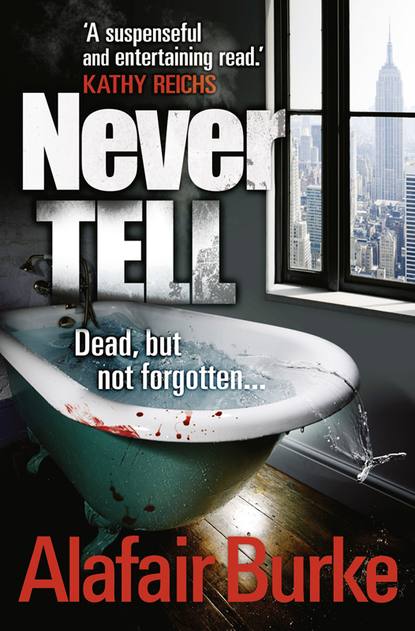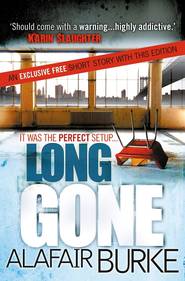По всем вопросам обращайтесь на: info@litportal.ru
(©) 2003-2024.
✖
Never Tell
Автор
Год написания книги
2018
Настройки чтения
Размер шрифта
Высота строк
Поля
CHAPTER ONE (#ulink_fd7eca20-77a2-52da-be9b-6768b161605b)
Second Acts: Confessions of a Former Victim and Current Survivor
“3:14 IN THE MORNING”
It has been twenty years, but at three-fourteen this morning I screamed in my sleep. I probably would not have known I had screamed were it not for the nudge from my husband—my patient, sleep-starved husband, who suspects but can never really know the reasons for his wife’s night terrors, because his wife has never truly explained them.
I could see the uncertainty coloring his face this morning as he sipped his coffee, already going cold, while I poured a fresh cup for myself at the counter, carrying the carafe to the breakfast table to top off his cup. Not uncertainty about my reasons for screaming—that was ever-present—but uncertainty about whether even to raise the subject. Should I ask her? Are some subjects better left in the subconscious?
I loved him so much in that moment—for loving me enough to care, for caring enough about me to let the unspoken remain so. And so, even though I would have preferred we peruse the newspaper together, sharing headlines with each other before he had to dash to work, I told him.
I screamed at three-fourteen in my sleep this morning because twenty years ago—more than half my lifetime ago—a man walked into my bedroom and changed my childhood forever. I did not hear him open the door but somehow I knew he was there. Maybe it was the sliver of light that penetrated the room from the hallway along with his footsteps. Or maybe it was simply because I had known for months that this moment—at some point, on some night—would eventually come to pass. When I opened my eyes, he was there, closing the door behind him. Unwelcome, but not unanticipated.
I remember expecting him to say something, to offer some flimsy excuse for entering my room, or maybe even to try floating some corny, flirtatious line, pretending like we were some kind of illicit couple. But he didn’t say anything. He took the four steps from the door to the foot of my bed in silence. I apparently wasn’t worth the expenditure of words.
I remember wanting to scream. Wanting to beat the shit out of him until he was dead. But it was as if some other part of my brain had already made the decision for me—no, at the time, it felt more like the decision had been made for us: the me in that room and the real me watching from afar. Neither of us would be screaming. We would not be defending ourselves. We would simply watch the bedside clock and wait for this night to be over.
I remember looking at the readout of the display, thinking about the squareness of those red numbers, how each digit could be formed by illuminating various combinations of seven straight lines forming two stacked squares. And the numbers on the readout at that one moment read 3:14—three-fourteen in the morning.
I saw those same numbers taunting me from my nightstand last night after my husband nudged me in our bed. They made me wish he had left me to scream in my sleep, unaware that my body and thoughts still, to some degree, belong to that man, and to that night, all these years later.
It has been twenty years since I stared at that old clock. Ten years since I married a man who was willing to look past my occasional tendency to burst out in tears during lovemaking. Seven months since I believed I was recovered enough to start this blog. One hundred and forty-three posts about my experiences as a survivor. Seventy-two thousand, eight hundred, and ninety words, not that I’m counting.
And with one scream at three-fourteen this morning, I felt once again like a victim.
But to my dear, sweet husband who was finishing his coffee before work, all I could say was, “I had a bad dream, babe. I think it was about those things that happened when I was young.”
And then after I kiss him goodbye and watch him make his way down the steps of our townhouse, briefcase in hand, I walk upstairs to sit at this desk and write down the truth that I still cannot speak aloud to the people who love me, even twenty years later.
Just like the woman said, it had been seven months since she’d first started the blog. “Second Acts: Confessions of a Former Victim and Current Survivor.” Even the title reeked of self-indulgence.
It wasn’t surprising that she’d gone to the trouble of counting the individual posts and even the number of words. She was exactly that type. She was that prideful. High and mighty.
The blog had started out as an anonymous project, but this particular reader knew precisely who had authored the past seven months and, apparently, 72,890 words of this self-involved, self-help-through-writing garbage. The reader scrolled down to the comments section at the bottom of the screen, bypassing the predictable remarks from the undoubtedly overweight, housebound trolls who followed this woman’s crap: “Hang in there, girl.” “One day at a time.” “Thank you for your honesty.”
Those were the comments that were most disgusting—the posts that thanked this woman for deluding herself into thinking she had any kind of insight into her current existence and for enticing even more pitiful souls to read and admire her.
The reader contemplated the blank text box on the computer screen, then began typing:
“If you thought that night twenty years ago was bad, wait until you see what I have planned. You won’t remember a single time on the clock. Maybe a day on the calendar if you’re lucky. Maybe a week. Or maybe I’ll keep you busy for a month. One thing I know for certain: You will not live to write about it.”
The tapping sounds against the keyboard were so quick and intense that the typist did not hear the approaching footsteps until a second face appeared, reflected in the laptop screen.
It was too late.
CHAPTER TWO (#ulink_c37d6cdc-9e77-59f0-9518-df32526361d2)
Ellie Hatcher had arrived in New York City with certain expectations. Influenced by iconic images of Times Square, the Plaza Hotel, and the Empire State Building, she anticipated bright lights, rows of towering skyscrapers, wide sidewalks filled to capacity with suit-clad businessmen and their briefcases, and a perpetual soundtrack of car horns, sirens, and construction equipment.
But now that she’d lived here for more than a decade, Ellie knew that those iconic images painted a tourist’s picture of New York City. Outside the movie version of this city, most New Yorkers lived quiet lives on peaceful streets, venturing into the madness only as necessary.
This morning found her on Barrow Street, among the narrow, tree-lined diagonals that formed the West Village. Nestled between Washington Square Park and the Hudson River, this was Ellie’s dream neighborhood, removed from the commercial worlds of the Financial District and midtown, protected from the fumes and sounds of frustrated commuters lined up at the bridges and tunnels.
But today a different kind of chaos had found its way into that charming neighborhood. It was a form of chaos to which Ellie had also become accustomed over the years: marked cars, fleet cars, uniforms barking into shoulder-mounted radios, plainclothes and techs gathering physical evidence, even a fire truck and an ambulance. It was the chaos and energy of a crime scene, complete with the yellow tape that separated the normal from the aberrant.
She overheard the murmurs among curious pedestrians as she and her partner, J. J. Rogan, made their way toward the taped perimeter.
“What’s going on? They’re filming?”
“Law and Order, I think. Not the regular one. That got canceled. But SVU still films here. Or maybe it’s that new show—that one with the blonde in the hat. Or was that one canceled too?”
Another bystander noticed them flash their badges to cross the perimeter. “You see that? It’s for real.”
“I thought that was Gwyneth Paltrow’s house.”
“No, she was on Fourth Street. And she sold it a few years ago.”
Ellie could understand the source of the real estate gossip once she had a chance to take in the townhouse to which they’d been summoned. Four floors that she could count above ground, plus what looked like a basement. Twice as wide as the other single-family houses on the block.
Through the etched glass of the front door, she was struck by the spaciousness of the entryway. Larger than her entire living room, the area was empty but for a round table topped with a vase of what appeared to be five dozen fresh tulips and, in the back corner, a sculpture that looked like it belonged in the Metropolitan Museum. A fireplace and Prius-sized chandelier completed the look.
“Damn,” Rogan said.
In short, the place was nice enough to earn a “damn” out of Rogan, who wasn’t as easily impressed as his partner.
The woman who made her way down the curved staircase seemed born and bred to live in this kind of home. Black slacks and an asymmetric tan jacket, for a look that was simultaneously casual and sophisticated. Salt-and-pepper bob, fresh from a salon blow-dry. But when she opened the door, the redness of her eyes reminded Ellie that they weren’t here to admire her lifestyle.
The woman’s gaze seemed to fix on their clothing. “Who are you?”
“Detectives from NYPD, ma’am. Ellie Hatcher.” She offered her hand, but the woman surprised Ellie by grabbing her forearm.
“Thank God.” Ellie assumed she was being pulled to the staircase, but the woman guided them instead into an elevator. It was decorated with photographs of defining moments of New York City from the seventies and eighties. A bar owner writing on a storefront sign during the blackout of 1977: No Lights, No Food, but Plenty of Booze. The Ramones playing at CBGB. Transients lined up outside the Bowery Mission. John Lennon in a crowd in Central Park. The final Simon and Garfunkel concert. Forty-second Street back when it was fleabag hotels and porno theaters. A graffiti-covered 6 subway train. It was a New York Ellie had never known.
The woman pushed the button for the fourth floor and the elevator began to creak its way up.
“You have to do something. It’s my daughter. I found her. In the bathtub. The blood. The water was so red. Her face was—so white.”
“I’m very sorry, ma’am, but why are you still here?” Ellie realized her response sounded cold. “I mean, we usually separate the family from this kind of chaos.”
“They’re up there already, but they’re not doing anything. I heard what they said. They didn’t think I could hear them talking, but I’m not deaf. They don’t believe me. They’re saying she did this. To herself.”
When the elevator doors opened, two uniformed officers were waiting—one short and fat, the other tall and lanky, very Laurel and Hardy. They looked alarmed, and then resigned, when they spotted the badges clipped to the waistbands of the latest arrivals in the hallway.
“Crap.” The skinny one spoke first, trying to explain their presence upstairs while a civilian roamed freely through a crime scene. “We were heading down. Waiting for the elevator. Guess she beat us to it.”
Rogan clicked his tongue as the two officers stepped onto the elevator. Ellie could tell he wanted to clunk their heads together. “Get the hell outside and help protect your scene,” he said. “Hatcher and Rogan. Arrived at eleven-twenty-seven. Write it down.” He jabbed his index finger against the fat cop’s breast pocket for emphasis.
The elevator began its creaky descent. “That’s what I was trying to tell you,” their hostess said. “They’re not taking this seriously. Please listen to me. My daughter did not kill herself.”








